Development & Postmortem
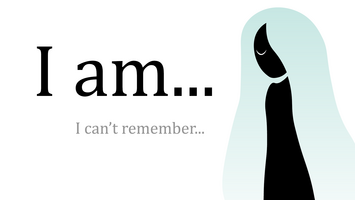
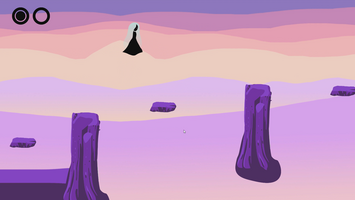
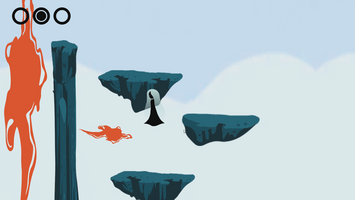
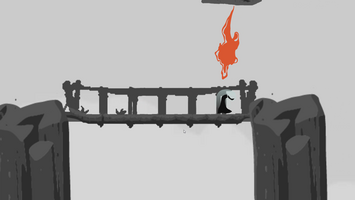
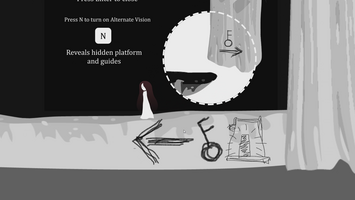
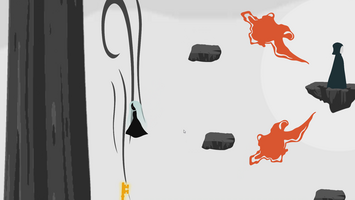
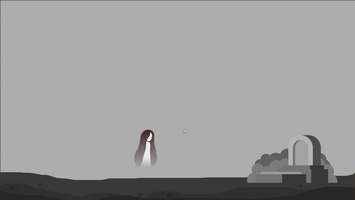
Development Overview
We were given 2-3 weeks to make a platform game where there has to be 5 levels with gradually increasing difficulty. I started doing research on multiple popular platforming games and watched their gameplay/played the games for inspiration. Some games that stood out to me were Gris, Alice Madness Returns and Ori and the Blind Forest. I then analyzed and listed game mechanics/elements I knew or observed and thought of ways to implement them into my game. I wanted to make a game where the player can somehow change form and combine different mechanics to get through a platform. I thought of 4 add-on special abilities I wanted my player to have for each form (unlocks with each corresponding level): Night Vision, Burn, Fly, Duplicate Self. However, after making the first demo and considering the time constraint, I stripped down the list to only keeping Flying as a mechanic (which was turned into the fan making the player levitate in level 5 since I thought this would put be less problematic in terms of player behavior prediction) and Night Vision, also implemented in level 5.
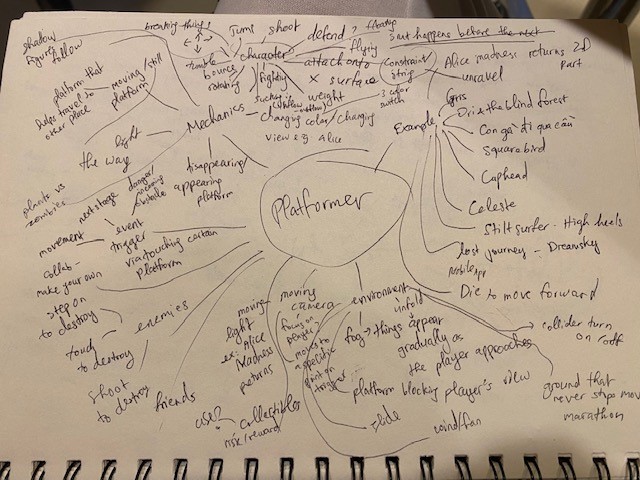
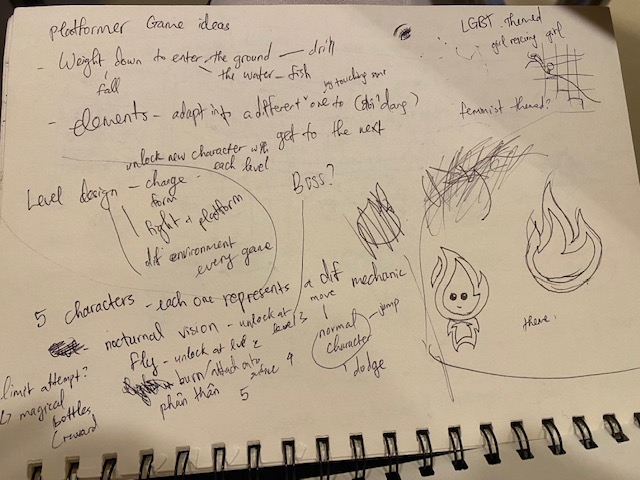
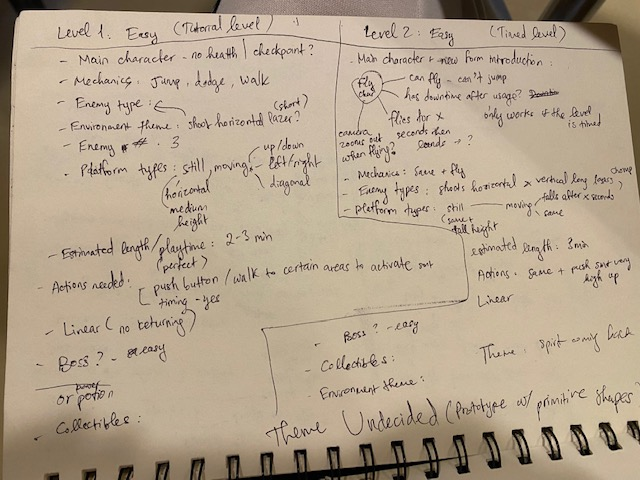
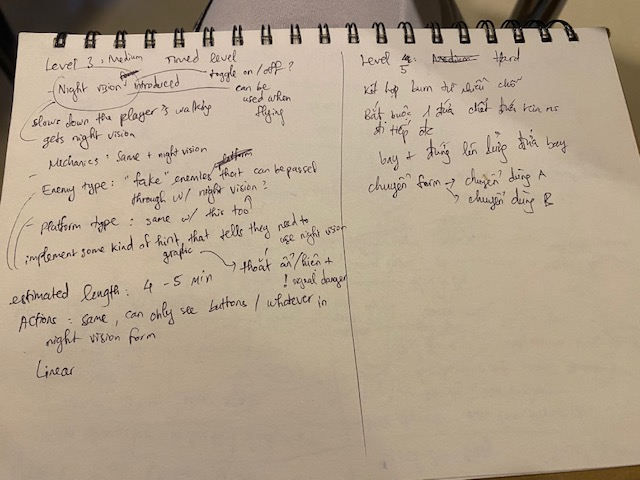
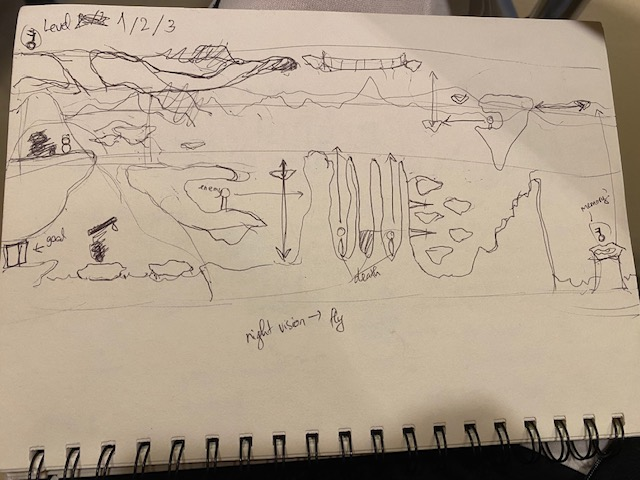
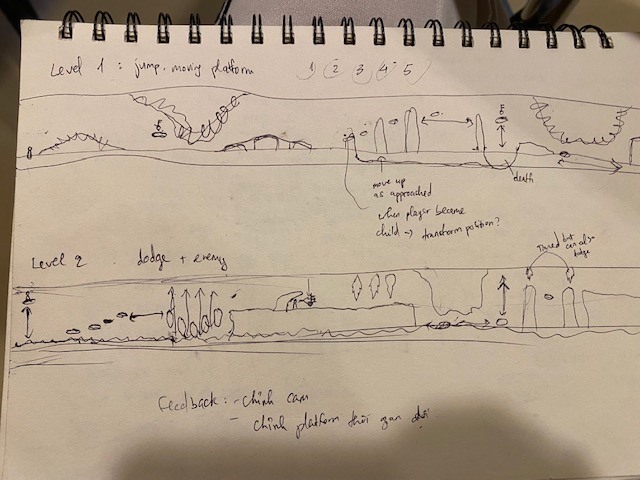
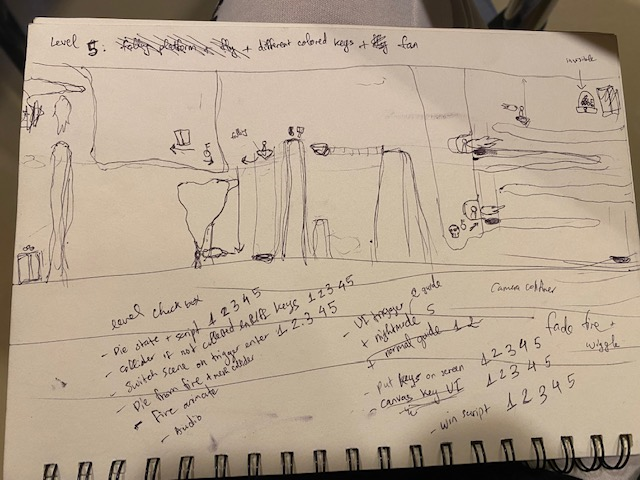
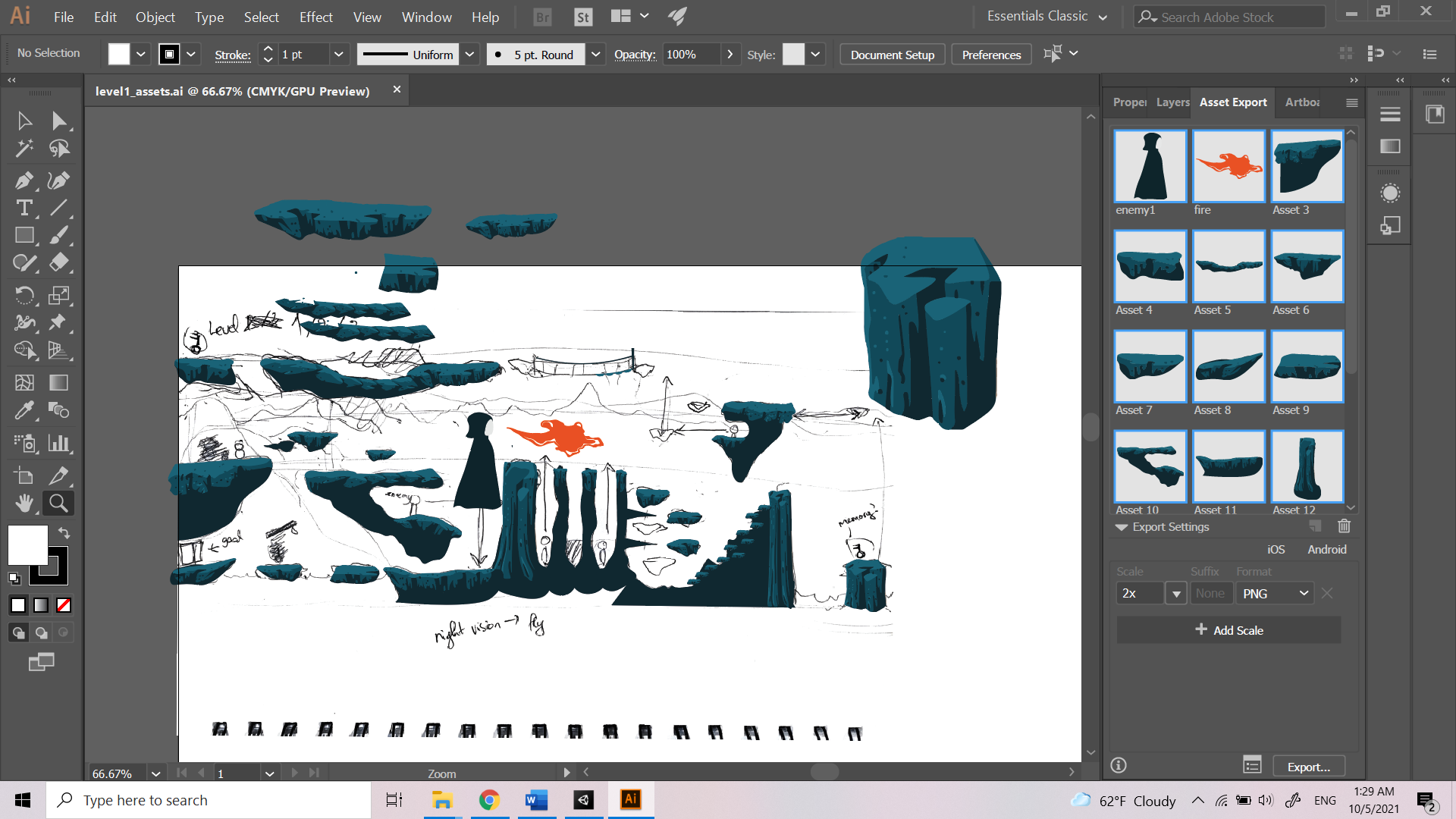
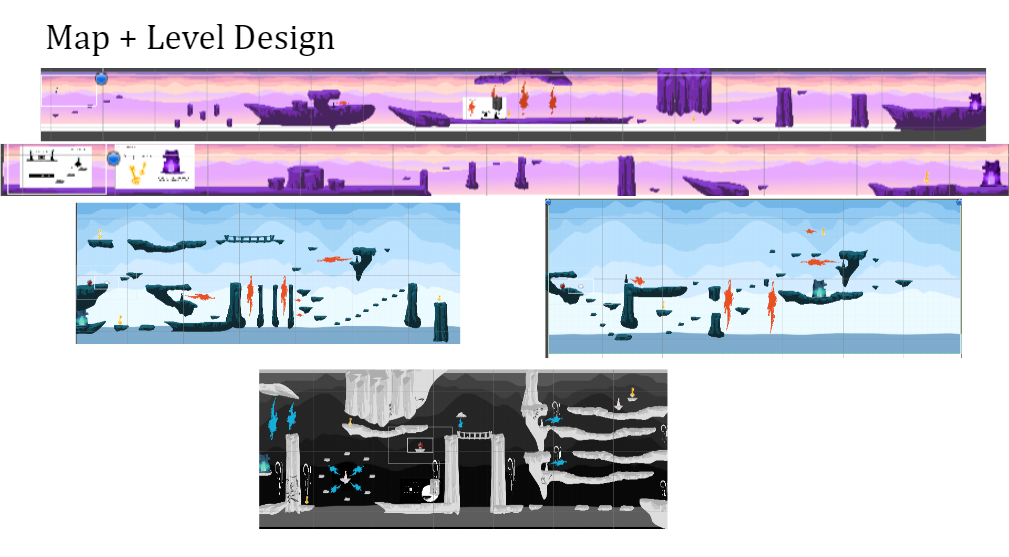

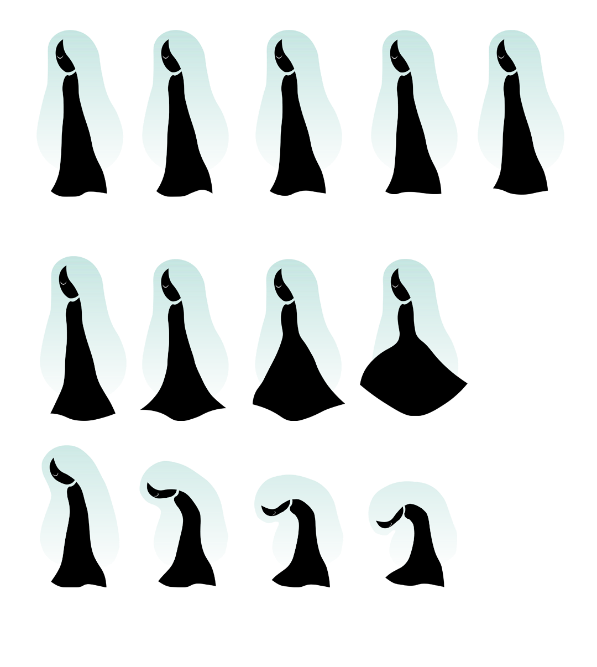

Playtesting Feedback:
- -The first feedback I got was that I should implement a way to guide players that they have to collect enough keys to pass through the gates e.g. an UI showing number of keys collected/total number. I got this feedback during the demo in class.
- -The second feedback I got was that I should animate the fire. I planned to draw this, however I didn’t have this in the final product because I ran out of time and I had to prioritize the game working over visual effects.
- -The third feedback is for me to balance the game at some parts e.g. the rate at which the fire blinks because it was very hard to get through the level when the player keeps dying.
- -The final feedback I got was from my friend who noticed that sometimes it’s hard to know where they’re going due to the limit of the camera viewport.
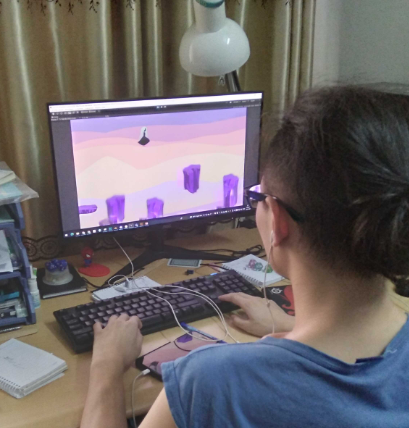
Postmortem
Successes
Narrative – I always like games with a story behind it and for this one I managed to weave together the elements that tell a story or evokes some kind of emotions from the audience e.g. the ambience, the character design that looks like a ghost (more so in the inverted color mode), the end scene when she uncovers that she is no longer alive. Even though it was not one of the requirements for the game, it was my personal success.
Art direction & theme – since I created most of the assets myself, it was easy to make the elements in the game consistent in style. The color scheme and designs overall I chose also conveyed the mood I wanted – which was calm and peaceful in the start but slowly gets darker and more somber towards the end – which was consistent with how the character felt as she realizes her own death.
Level design – I think that my game’s difficulty increased pretty gradually since I playtested and tweaked it multiple times. Most of the things in the scene are operating the way I want them to and the player generally knows where to go based on the way I placed my elements.
Control feel & character animation – The controls and character animation are pretty smooth overall which helps with gameflow and player’s enjoyment.
Setbacks
Time – the problem that everyone has. I’m not used to flushing out good games within a short time and naturally, there were things I have not managed to finish in this game. The prime example is the still fire, which would look a lot better if I had time to animate it. I made a whole list of task by priority and I couldn’t finish all of it, but this was my solution to the lack of time.
Coding knowledge – I am not the best in terms of coding, so I always try to find the simplest solutions and reuse them time after time. Digging the internet for codes that I need consume a lot of my time, as with me testing it out and finding ways to fix it when it does not work. However, I’m glad I still managed to gather and write most of the codes that I need for this project.
Signifiers – I didn’t have too many natural signifiers in the game e.g. for when the fire is about to blow or when the platform will fall. Again, this is something I would really work on with more time.
Technical issues – Near the end of my process I exported the game. It did not work and gave me errors which caused me last minute problems to deal with. Luckily I found the solution on Google. The audio I wanted also wasn’t working when I put it in Unity but I fixed it now.
Lessons Learned
Time management – I still have a lot to learn in terms of scoping and knowing how much time I would take to do which individual tasks. I worked really hard on this project but it is also at the cost of my wellbeing because I took too much time to find solutions for the wrong things. This is why I sorted tasks by priority to counteract my tendency to go off-track and focus on small insignificant details.
Project management/planning – I improved significantly in my planning process for this game compared to the last games I worked on. I learned to organize my ideas and write down the tasks that I need to do in the game so that I would not feel clueless in terms of my game direction.
Coding knowledge – I think I understood coding in C# a little bit more after this project. I wrote many simple codes and I’m getting more used to the structures and how things function in general.
Platforming genre – I did a lot of research on platformer games at the start of the development process and I found some very interesting mechanics and gameplay. I also learned more about what is expected in a platformer game.
Next Steps
I will continue to work on the issues I have mentioned above to improve my abilities with time. For the next project I hope I can scope better. My previous boss, who was the CEO of an indie game company, told me that scoping is very hard to do and is often overlooked. I feel that now. As for later, I will continue working hard, taking in feedbacks and making better games. Normally I enjoy working on my own so it will be very different in a group. I look forward to finding the solutions for working in a team in the next project.
Files
Get I am...
I am...
| Status | Prototype |
| Author | meemeemy's game design portfolio |
| Genre | Platformer |
| Tags | 2D, Atmospheric, Narrative |
Leave a comment
Log in with itch.io to leave a comment.